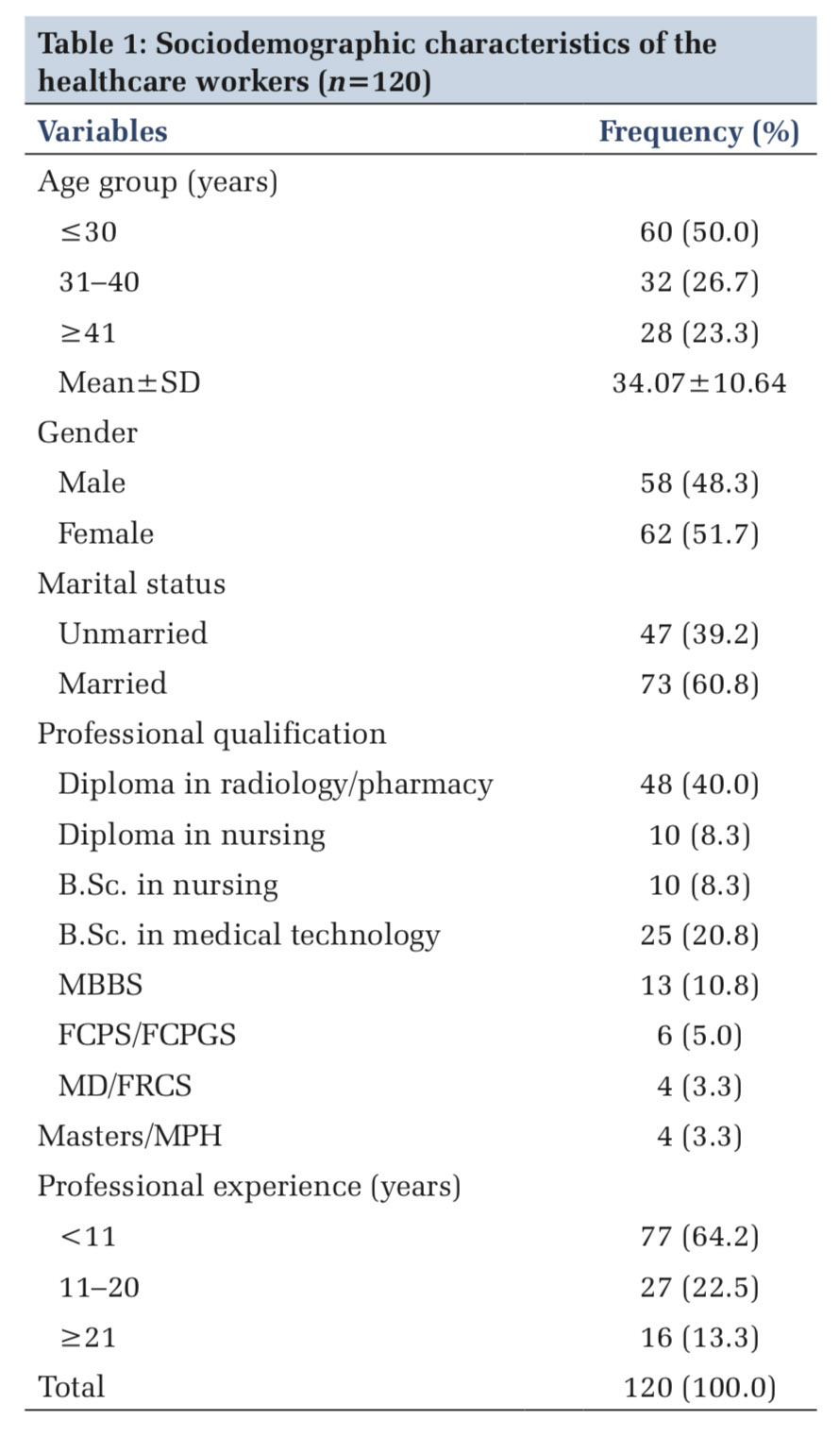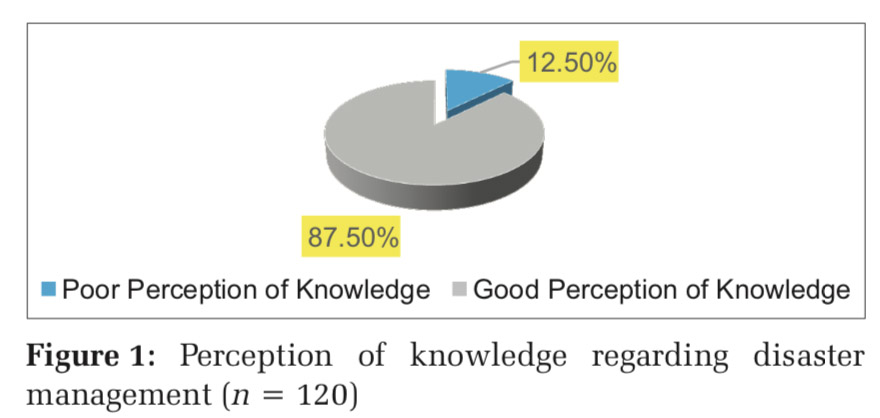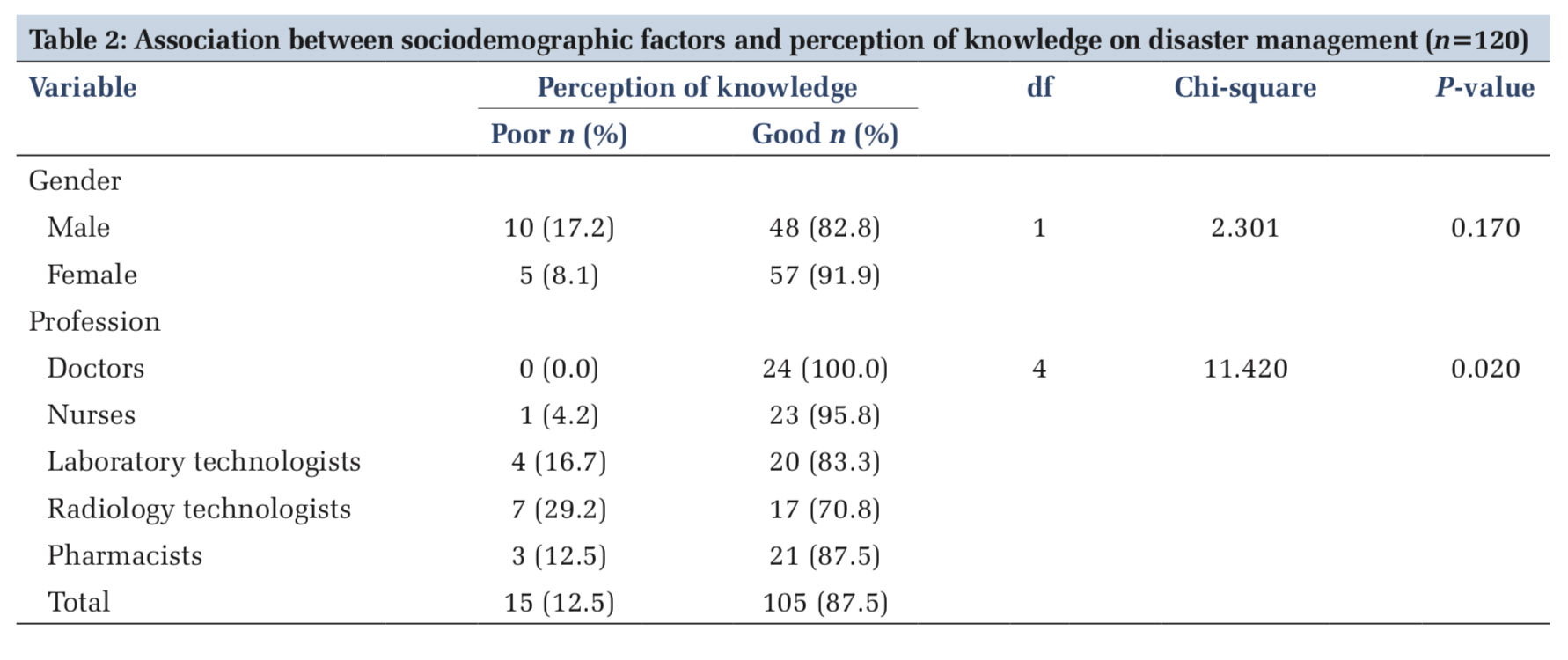

Journal of Medical Sciences and Health
DOI: 10.46347/jmsh.2019.v05i03.007
Year: 2019, Volume: 5, Issue: 3, Pages: 39-43
Original Article
Atoshi Bazi Rahman1, Mainul Alam Chaklader2, Faisal Muhamad3
1Student, Department of Public Health, School of Health Sciences, State University of Bangladesh, Dhaka 1205, Bangladesh,
2Assistant Professor, Department of Public Health, School of Health Sciences, State University of Bangladesh, Dhaka 1205, Bangladesh,
3Research Associate, Department of Public Health, Faculty of Allied Health Sciences, Daffodil International University, Dhaka 1207, Bangladesh
Address for correspondence:
Faisal Muhammad, Research Associate, Department of Public Health, Faculty of Allied Health Sciences, Daffodil International University, Dhaka - 1207, Bangladesh. Phone: +8801723406483. E-mail: [email protected]
Background: Worldwide disasters are a common event nowadays. A disaster is an incident that can cause massive disruption and damage. Disaster can be dramatically affected many people, either directly or indirectly. The affected people may die, injures and it also destroyed their houses, health system, and interrupted their lifeline. The study was aimed to identify the perceptions of knowledge regarding disaster management among healthcare workers in Bangladesh.
Material and Methods: A total of 120 healthcare workers were selected to participate in this study using two stages of sampling technique. The study was carried out using a cross-sectional survey in the two selected medical college hospitals in Dhaka city of Bangladesh within a period of 4 months (January 2017–April 2017). The data were collected using a pre-tested self-administered semi-structured questionnaire and were analyzed using the Statistical Package for the Social Sciences ver-20.0.
Results: In the present study, the mean age of the study respondents was 34.07 ± 10.64 years. About 51.7% of the study participants were female. Two-fifths (40%) of the study participants had diploma in radiology/pharmacy followed by B.Sc. in medical technology (20.8%) and MBBS (10.8%). More than three-fifths (64.2%) had < 11 years of professional experience.
Conclusion: The level of good perception of knowledge of females was slightly higher than that of males. The doctors were found to have higher level of good perception of knowledge than those from other professions. The finding reported that close to nine-tenths of the study participants had good perception of knowledge regarding disaster management and the profession of the study participants was found significantly associated with the perception of knowledge regarding disaster management.
KEY WORDS: Disaster, healthcare workers, knowledge, management, perceptions.
Global Disasters Report of the year 2015 reported about 317 different natural disasters worldwide in the year 2014, affecting 94 countries. Close to half (48%) of all disasters occurred in Asia in 2014. Asia had a region that mostly affected by the disasters estimated that more than nine-tenths (90.13%) of worldwide disasters come across Asia.[1] Nowadays, disasters are common worldwide. It may dramatically impact on many people, kills and injured them as well as damage and destroyed their houses, health system, and interrupted their lifeline.[2] Disasters are said to be the situation that disorganized the life and cause many problems that may affect the life of the society.[3] Management processes are designed to manage emergency situations and the disasters and also help the people who are at the risk of disaster and to recover after the situation has been occurred.[1]
Healthcare workers including are critical agents in any disaster management plan and need to be well involved and ready to respond to health threats. They are the first line of emergency defense with the aim of delivering a good and acceptable quality of care while saving lives.[4] The World Health Organization and International Council of Nurses recognize the urgent need for building capacities of healthcare workers in disaster management to protect people, to decrease the number of death and injuries, and to maintain the overall health of the community and the functioning of health systems.[5]
Bangladesh is vulnerable to periodic natural disasters due to its conical shape and location on the tip of the Bay of Bengal.[6] Bangladeshis are suffering a lot from flood disaster and government spends a huge amount of money in such ineffective flood management programs.[7] In terms of natural and anthropogenic hazards, Bangladesh is one of the most vulnerable countries globally.[8] There are many disasters of concerned in Bangladesh, i.e., droughts, fire, river erosion, earthquakes, infrastructure collapse, floods, high arsenic contents of groundwater, cyclones, tornadoes, waterlogging, epidemic and water and soil salinity, etc. All these events are said to be termed as disasters when they harmfully affect the entire environment, including human beings, shelters, and the resources essential for livelihoods.[8] The study was aimed to identify the perceptions of knowledge regarding disaster management among healthcare workers in Bangladesh.
Study design, type, period, and population
A total of 120 healthcare workers were selected to participate in this study using two stages of sampling technique. The study was conducted using cross-sectional survey among the healthcare workers from two selected medical college hospitals in Dhaka city of Bangladesh. The study was conducted among the healthcare workers of Dhaka Medical College Hospital and Enam Medical College Hospital within a period of January 2017–April 2017. Sixty healthcare workers from each of the two medical college hospitals were recruited. The healthcare workers who give consent of participation and spent at least 6 months in the selected hospitals were included in the study. Nevertheless, the study participants who were not available or ill during the data collection were excluded for participation.
Data collection and analysis
The questionnaire used in this study was pre-tested in another hospital in Dhaka city of Bangladesh to ensure the reliability, validity, and practicability. After pre-testing was carried out, some modifications were made. The data were collected using self- administered semi-structured questionnaire. All the collected information were coded numerically and entered into the Statistical Package for the Social Sciences ver-20.0 for analysis. P < 0.05 was considered as statistically significant.
Ethical consideration
All ethical issues related to this research were addressed according to the guidelines of ethical review committee of State University of Bangladesh (SUB). Permission was taken from the concern authorities. Written informed consent was taken from the study participant before starting the data collection. Confidentiality of the respondents was maintained.
Sociodemographic characteristics of the healthcare workers
Table 1 shows that half (50%) of the study participants were ≤30 years followed by 31–40 years (26.7%) and the rest were ≥41 years. The mean age of the study respondents was 34.07 ± 10.64 years. About 51.7% of the study participants were female and the remaining study participants were male. Little above three-fifths (60.8%) of the study participants were married and the rest were unmarried. Two-fifths (40%) of the study participants had diploma in radiology/pharmacy followed by B.Sc. in medical technology (20.8%) and MBBS (10.8%). About 8.3% had diploma in nursing followed by B.Sc. in nursing (8.3%) and the rest had other educational qualifications (11.6%). About 64.2% had < 11 years of professional experience followed by 11–20 years (22.5%) and the rest had ≥21 years of professional experience (13.3%).
Level of perception of knowledge regarding disaster management
Figure 1 shows that close to nine-tenths (87.5%) of the study participants had good perception of knowledge regarding disaster management and the remaining had poor perception of knowledge regarding disaster management.
Association between sociodemographic factors and perception of knowledge on disaster management Table 2 shows that gender of the study participants was found not significantly associated with perception of knowledge regarding disaster management. The level of good perception of knowledge of females was slightly higher than that of male. It also shows that profession of the study participants was found significantly associated with perception of knowledge regarding disaster management. The doctors were found to have higher level of good perception of knowledge than the rest of the study participants from other professions.
Bangladesh is one of the countries that had the worst problems of natural disasters. Disaster management in Bangladesh has undergone a complex process of development. The disaster management system of Bangladesh is workable, it includes some set of mechanisms and processes, as well as a whole range of ways and means for the management of disasters.[9]
In this study, close to nine-tenths (87.5%) of the study participants had good perception of knowledge regarding disaster management. Another study reported that the study participants were knowledgeable about what disaster is all about, disaster plan, and disasters preparedness.[10] A similar study conducted among public health nurses reported a moderate level of practice regarding disaster management.[11]
A disaster occurs with or without warning, causing death, injury or disease, damage to property, and the infrastructure of the environment. Sudden disaster leads to emergency an unforeseen event that calls for immediate measures to minimize its adverse consequences.[12] Due to this reason, knowledge and awareness of disaster preparedness and management should be given a higher priority in the health sector. In the present study, about 12.5% of the study participants had poor perception of knowledge regarding disaster management. A hospital-based study from African country reported that about 70.3% of respondents did not know components of hospital disaster plan.[13] Another study among nurses also reported that they are not aware of disaster management protocols in their working place and not fully prepared for disasters.[3] A study conducted in Tehran reported a very weak preparation against any emergency and disasters in the hospital of study.[14]
In our study, the finding showed that the gender of the study participants was found not significantly associated with perception of knowledge regarding disaster management. The level of good perception of knowledge of females was slightly higher than that of male. Our findings show that profession of the study participants was significantly associated with perception of knowledge regarding disaster management. However, the doctors were found to have higher level of good perception of knowledge than the rest of the study participants from other professions. Astudy reported that hospitals are both high-risk and high response organizations and should engage specific strategies and hospital response strategies.[15] It has also been evident that the impact of disasters is believed to be increasing in the health setting and nurses are more likely to be confronted with a need to be working with an effective system of communication with other persons who are responsible during event.[16]



The finding reported that close to nine-tenths of the study participants had good perception of knowledge regarding disaster management. It also reported that gender of the study participants was found not significantly associated with perception of knowledge regarding disaster management. However, the profession of the study participants was found significantly associated with perception of knowledge regarding disaster management.
Recommendations
Disaster management committee should be created in the hospital and disaster management plan should be accessible for all the healthcare workers. It is said to be the duty for every healthcare worker to be aware of the rules and responsibilities regarding disaster management. We also recommend a further research in this area.
Limitations
One of the limitations of this study was insufficient time to collect the appropriate sample size and lack of adequate referencing articles because there was limited information available on the perception of knowledge regarding the disaster management in Bangladesh as well as the global scenario.
The authors expressed their appreciation to the Department of Public Health, School of Health Sciences, SUB, Dhaka, Bangladesh, for approving the study and also special gratitude goes to each respondent for giving us consent of participation and providing valuable information.
Subscribe now for latest articles and news.